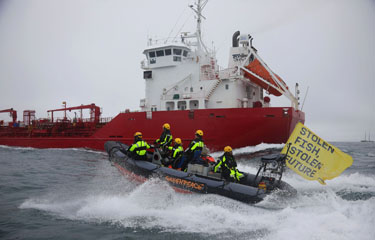Greenpeace targets fishmeal industry via new Africa-EU campaign

Governments in West Africa should halt the manufacturing of aquafeed and animal feed that uses fish fit for human consumption, according to environmental activist nonprofit Greenpeace.
On Thursday, 7 October, the Greenpeace vessel Rainbow Warrior intercepted the Key Sund, a tanker transporting fish oil from West Africa, via the English Channel. In a statement, Greenpeace said the action was taken to bring attention to the alarming rate of growth of West Africa’s fishmeal and fish oil industry, which the organization said is primarily operated by Asian and European companies and which is jeopardizing the region’s food security – and the sustainability of its coastal fishing communities.
A Greenpeace banner was raised during the protest, reading “Cargill, Mowi, Skretting, BioMar: Was this fish oil stolen for you?” Greenpeace claimed all four aquafeed manufacturers have sourced fishmeal and fish oil from Mauritania to produce aquafeed for farmed salmon. A related Greenpeace-affiliated protest took place at the Mballing fish processing site in Mbour, Senegal, on Monday, 4 October.
“The fish they used to produce this oil should be bought and sold in local markets,” Fatou Samba, president of the women fish processor’s association, said during the protest, according to Greenpeace. “It could be creating jobs and feeding people in my community, or anywhere in West Africa. But instead it will be fed to farmed fish and animals in Europe. This has to end, before this crucial source of food and jobs for us is destroyed.”
More than 500,000 MT of fish are caught annually in West Africa to feed the fishmeal and fish oil industry for feeding farmed fish, livestock, and pets in Asia and Europe, according to Greenpeace. That total is enough to feed 33 million people in a region subject to significant food insecurity and where fish prices have rocketed in many areas as fish populations have plunged, Greenpeace said.
“This is big business stripping life from our oceans, and depriving our fishing communities of their livelihoods. The science is clear, it will soon be too late. They must stop now,” Greenpeace Africa Oceans Campaign Manager Aliou Ba said.
Greenpeace is demanding action by importers and regional governments to curtail fishmeal and fish oil exports from West Africa to Europe and Asia. It identified Mauritania as the top source of ingredients used in making fishmeal used by Europe’s salmon-farming sector. Greenpeace said fishmeal exports from Mauritania to the European Union rose 16 percent and its fish oil exports increased 6 percent in 2020.
The E.U. has said previously it produces between 400,000 and 600,000 metric tons (MT) of fishmeal and between 120,000 and 200,000 MT of fish oil, an equivalent of 10 to 15 percent of global production.
However, according to the European Market Observatory for Fisheries and Aquaculture (EUMOFA), a market intelligence tool covering the E.U.’s fisheries and aquaculture sector, imports of fishmeal from non-E.U. suppliers decreased by 54 percent from 2009 to 2020 and that the “difference between imports and exports is shrinking,” even though the E.U. is still a net importer of fishmeal.
IFFO, the international trade body that represents the marine ingredients industry, said in a statement to SeafoodSource it also wanted to see improvement in how the fishmeal and fish oil industry conducts business in West Africa.
“Although IFFO is not well-represented with members in the West Africa region, we are eager to be involved in moving the global fishmeal industry forward towards the high standards we expect,” it said.
IFFO said it has worked to strengthen collaboration with partners on the ground in West Africa, including the Institut Mauritanien De Recherches Océanographiques Et De Pêches (IMROP).
“The reality in each of the West African countries is very different and some notable change in fisheries regulation are underway. In Mauritania, as of 2020, sardinella catches are all destined for human consumption. The Mauritanian small pelagic fishery improvement project (FIP) was launched in 2017. This FIP represents a collaboration between seven fishmeal producers and some of their customers, and the funds generated through this collaboration have helped to support some of IMROP’s work related to monitoring and surveillance of stocks. The FIP committee aims to provide the IMROP staff with additional resources for sampling tools, biological research, and data collection,” it said. “This is noted as the way forward by many, however, a broader regional approach is essential to ensure effective management and enforcement for these transboundary stocks. As the situation relies on decisions being made by many different stakeholders, we believe in a multistakeholder approach towards improved fishery management and engagement with local communities, placing food security at the heart of every decision.”
Additional reporting by Mark Godfrey
Photo courtesy of Greenpeace






Share